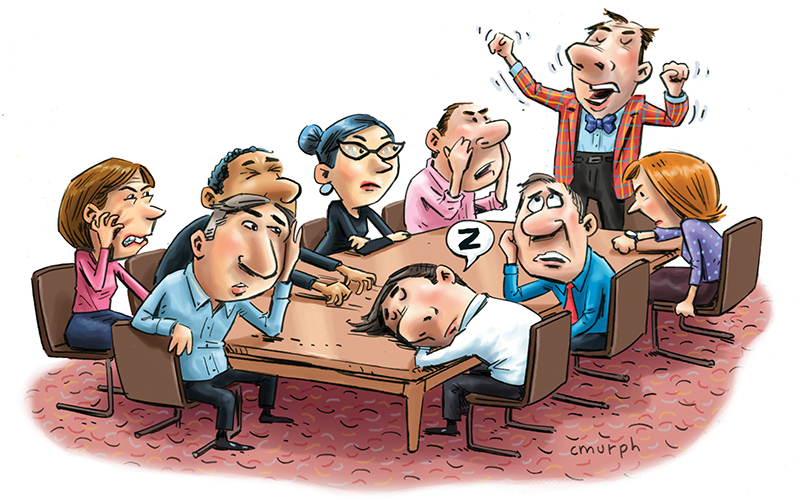
Our club was doing great. The Toastmasters goal of providing a supportive environment was fully actualized. Our weekly program nurtured everyone and speaking skills mushroomed.
It was all so perfect. Until He joined. Have you ever had a member who, frankly, you wished would join another club?
Our club includes a cornucopia of people, creating diverse and enlightening listening and learning experiences. Guests are always cherished and treated accordingly, resulting in a continual flow of new members. While I adored some members more than others, in three years as a Toastmaster, I’d never encountered anyone quite like Him. As a result of this one member’s offensive behavior, my once enjoyable meetings became only tolerable.
I didn’t want to leave my “family” of Toastmasters, but neither did I want to chew the insides of my cheeks raw every time he spoke. Thus, I was forced to problem solve. Unfortunately, I did not have the good sense to begin with such a tactic. During and between meetings, I split my energy between blaming, berating, and bemoaning my fellow Toastmaster.
Fortunately, I discovered that such a situation can be resolved without losing one’s sanity or the joy and growth that Toastmasters offers. Here’s how:
Identify specific behaviors that trigger your emotions.
Remember, each of us responds to the world uniquely. Every time we react to another person strongly—positively or negatively—it says as much about us as it does about the person. Accept responsibility for your feelings and thoughts. What drives you to distraction may actually be enjoyed by another member.
During and between meetings, I split my energy between blaming, berating, and bemoaning my fellow Toastmaster.
Talk privately to the individual.
Use the “sandwich technique.” Rather than venting to other Toastmasters and risk splitting club affections or possibly causing more conflict, consider the situation as yet another Toastmasters learning experience. Once you have identified specific behaviors that you find annoying, share them as you would a helpful evaluation, sandwiched between positives. Everyone has at least a few positive attributes! Use assertive rather than passive, passive-aggressive, or aggressive communication, using a lot of “I statements” as opposed to “You statements.” For example, say, “I felt uncomfortable when you told that off-color joke” rather than, “You were so obnoxious.”
Timing is critical, even when there are no lights to guide you!
Choose a time when you are not upset and stick to the issue—the issue being your response to specific behaviors. Plan to meet for coffee, away from the club, in a relaxed setting. Give yourselves enough time to talk and be prepared not only to express yourself directly and kindly, but also be ready to listen.
Remember the Toastmasters mission statement.
We gave an oath when we joined this extraordinary organization to provide a “mutually supportive” environment for our fellow members. There aren’t any exceptions or addendums stipulating that we only need to support those we like. It’s a huge challenge to make the Toastmasters mission statement come alive when faced with a member who presents obtuse evaluations that seem to strip the recipients of any confidence, or a member who chronically uses the club as a platform for political or religious reform, or a member who never shows up when scheduled as a functionary. Well-communicated feedback can be a powerful tool. Use that tool for your sake as well as your club’s sake, and even for the possible benefit of the member you’re reacting to with alarm, irritation, or anger.
Serendipity happens through other members who touch our lives and teach us what we most need to know.
Don’t quit Toastmasters!
A brief “time out” may be helpful, however, to gain perspective. This isn’t always necessary, of course. But there are times when we are too close to a situation, thus blurring our vision. Stand back; take a deep breath, refocus, and return.
If the above approach doesn’t work, find a mediator.
It’s important that the mediator be objective. This person might be the Club President or someone else in the club. Their expertise can be extremely valuable in sticky, uncomfortable situations. It stretches his or her communication skills, too! If the issue is violating Toastmasters ethics or threatening club morale, an objective mediator is especially important. If you are considering leaving, perhaps there are others who feel the same way.
In our club’s situation, a mediator was found and the problem was resolved. In the process, I discovered that my nemesis was, in fact, my teacher. He taught me a lot, indirectly and experientially, about myself and communication. In an effort to change him, I changed myself. I grew out of the struggle. Did I do it all graciously, ideally, and with a perfect outcome? Only about as well as I did my Ice Breaker and with about as much comfort. Sometimes our most important personal and communication growth in Toastmasters occurs even when we are far removed from the lectern. Serendipity happens through other members who touch our lives and teach us what we most need to know.



 Previous
Previous
 Previous Article
Previous Article